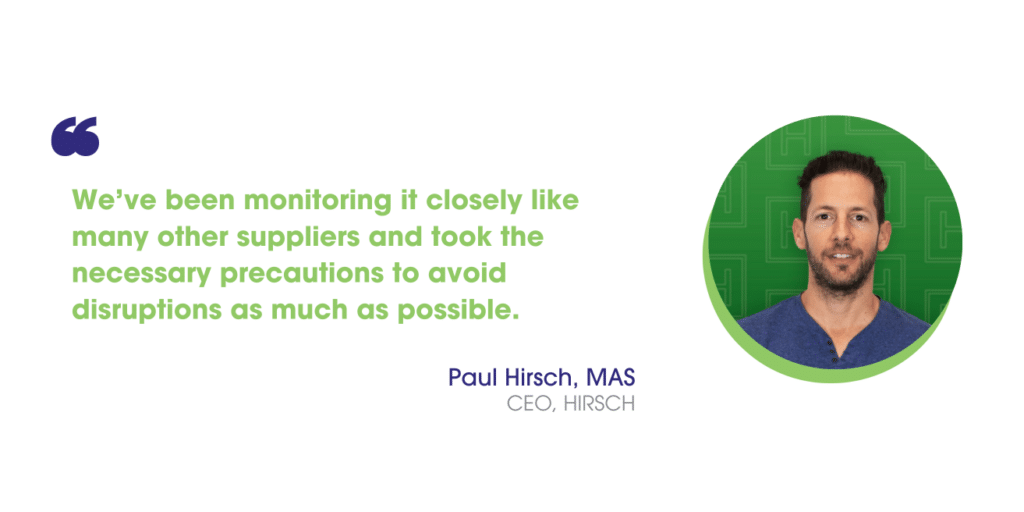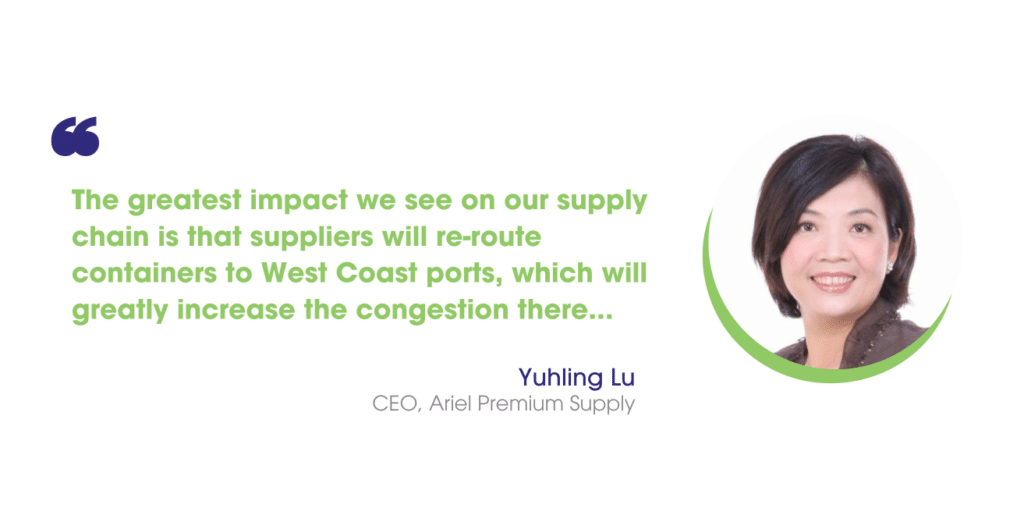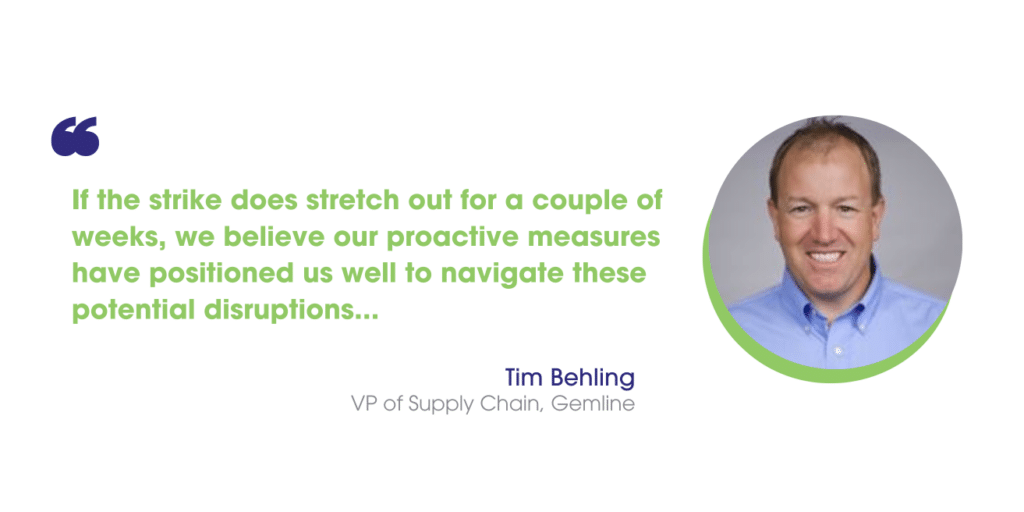At 12:01 a.m. on Tuesday, nearly 50,000 members of the International Longshoremen’s Association (ILA) kicked off the union’s first strike in nearly 50 years, causing ports along the East and Gulf coasts to shut down.
- While the ILA says that it has closed all ports – 36 in total – from Maine to Texas, reporting by CBS News has only so far confirmed that 14 ports are expected to close during the strike.
The strike, which has been brewing since the summer, has disrupted the nation’s supply chain ahead of the holiday shopping season. Businesses across nearly all industries, including the promotional products market, have been scrambling to figure out how to handle such a large work stoppage.
- The affected ports are responsible for handling approximately 43% of U.S. imports.
- Sea Intelligence estimates the ports to account for $3.7 billion per day.
Rick Cotton, executive director of the Port Authority of New York and New Jersey, has announced that nearly 100,000 containers will remain stored at the port until the strike ends, Reuters reported.
- Another 35 ships are expected to arrive at the port over the next week, and they’ll remain at anchor during the strike.
- A number of East Coast ports have provided updates about what a work stoppage means for their immediate logistics and services.
Promo Perspective
John Janson, vice president of global supply chain for SanMar – PPAI 100’s No. 1 supplier, which accounted for nearly $4 billion in revenue in 2023 – previously told PPAI Media that the strike “would have a catastrophic effect on the overall U.S. economy.”
Now Janson predicts that the work stoppage will last three to four days at a minimum. “If the sides don’t move to an agreement after that, it could extend much longer,” he says.
Echoing the sentiments of business leaders in the promo industry and beyond, Paul Hirsch, MAS, CEO of HIRSCH – PPAI 100’s No. 20 supplier – hopes that a resolution is reached sooner rather than later.

“While it’s unfortunate that a deal couldn’t be struck in time to prevent the strike, we’ve been monitoring it closely like many other suppliers and took the necessary precautions to avoid disruptions as much as possible,” Hirsch says.
Last year, on the other side of the country, the International Longshore and Warehouse Union (ILWU) managed to ratify a six-year contract, narrowly avoiding a similarly costly work stoppage. As a result, West Coast ports are open and operating at full strength, but it’s too late for any company thinking about shifting their plans for imports.
- Ports in Long Beach and Los Angeles have also said that they are currently handling a volume of containers that rivals the shipping influx in 2021.
“It’s another major situation compounding on top of other dynamics, like continued rising container costs, the diversion of shipping around the Middle East and other logistical concerns,” Yuhling Lu, CEO of Ariel Premium Supply, PPAI 100’s No. 17 supplier, told PPAI Media.
“The greatest impact we see on our supply chain is that suppliers will re-route containers to West Coast ports, which will greatly increase the congestion there, creating delays and almost guaranteeing higher unloading and transit costs. Plus, we’ll have to contend with possible limited availability of train and truck trailer carriers.”

Gemline – the No. 11 supplier in the PPAI 100 – began shifting some shipments to West Coast ports a couple months ago, according to Tim Behling, vice president of supply chain at Gemline.
“We don’t expect any immediate impacts to our supply chain,” Behling says. “We did take proactive steps earlier this year to allow Gemline to minimize and mitigate potential disruptions.
“We’ll continue to work with our logistics partners to manage our inbound freight to alternate locations and utilize other ports as we dispatch new shipments from our supplier partners. If the strike does stretch out for a couple of weeks, we believe our proactive measures have positioned us well to navigate these potential disruptions, and we will continue providing excellent service to our customers in Q4.”

Beyond direct and immediate impact, it’s possible that the entire promo industry would be affected by the ramifications of a prolonged strike.
- Sea Intelligence suggests even just one day of work stoppage would cause 5-7 days of slowdowns, and a strike lasting one week would result in a slowdown that wouldn’t be cleared up until nearly Thanksgiving.
- The domino effect of this would have consequences for the supply chain and, ultimately, the economy, quite possibly affecting the budgets of promo clients.
How Did We Get Here?
The labor contract between the ILA and the United States Maritime Alliance (USMX), which represents the ports, expired late Monday after the parties couldn’t reach an agreement over pay and a cap on the ports’ use of automation, The Associated Press reported.
- In a last-ditch effort to avert a strike, the USMX offered a nearly 50% wage hike over six years, CNBC reported. The ILA rejected the offer.
“The ocean carriers represented by USMX want to enjoy rich billion-dollar profits that they’re making in 2024, while they offer ILA longshore workers an unacceptable wage package that we reject,” the ILA said in a press release. “ILA longshore workers deserve to be compensated for the important work they do keeping American commerce moving and growing.”
USMX’s website has been unresponsive since the strike began, but the alliance shared these comments with CNN:
“USMX is proud of the wages and benefits we offer to our 25,000 ILA employees, and strongly supports a collective bargaining process that allows us to fully bargain wages, benefits, technology, and ensures the safety of our workers, day-in and day-out. We have demonstrated a commitment to doing our part to end the completely avoidable ILA strike. Our current offer of a nearly 50% wage increase exceeds every other recent union settlement, while addressing inflation, and recognizing the ILA’s hard work to keep the global economy running.”
What does a port strike mean for the US economy?
— John LeFevre (@JohnLeFevre) October 1, 2024
Harold Dagget, the chief negotiator for the International Longshoremen Association explains:
"I will cripple you, and you have no idea what that means. I do. Let me explain…” pic.twitter.com/5fIkNGAiyg
U.S. Chamber of Commerce President Suzanne Clark has urged President Joe Biden to use his authority to prevent a walkout for 80 days. “It would be unconscionable to allow a contract dispute to inflict such a shock to our economy,” Clark said in an open letter to the president.
However, Biden told reporters on Sunday that he doesn’t plan on intervening.
“Because it’s collective bargaining. I don’t believe in Taft-Hartley,” Biden said, referring to the Taft-Hartley Act, which allows the government to force union workers back to work when it’s deemed sufficiently necessary for the good of the country.
- Biden has made statements and gestures during his term to appear as a union-friendly president who strongly favors letting such issues be resolved through collective bargaining.
Janson noted that Daggett, the union’s president, is nearing retirement and that he may be more willing to go the distance in a standoff with the ports as a symbol of toughness for his legacy.
- Along with the West Coast port labor negotiations, last year also saw UPS come precariously close to a consequential strike that was averted at nearly the last hour.


